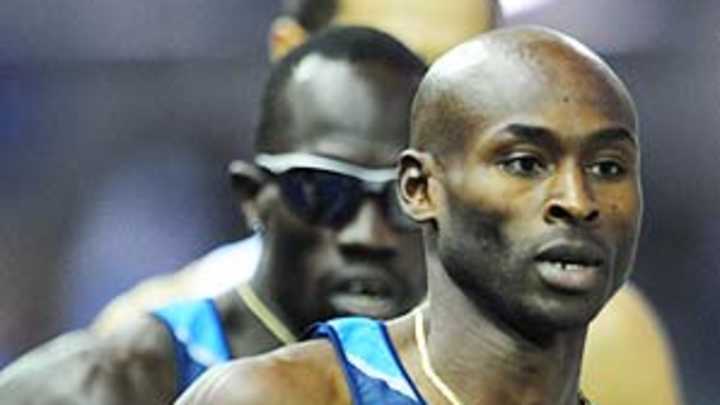In historic 1,500 for trio of U.S. runners, Lagat finishes third

Bernard Lagat's attempt to replicate his historic showing at another world championship was wrapped in a box Wednesday night, and Lagat couldn't get out of it.
The defending champ in the 1,500 and 5,000 meters settled for a bronze in the 1,500 at Berlin's Olympic Stadium on Wednesday night, after losing almost 200 meters to a bottleneck in the final lap. Bahrain's Yusuf Saad Kamel won the race in 3 minutes, 35.93 seconds, with Deresse Mekonnen of Ethiopia second in 3:36.01 and Lagat on his heels in 3:36.20.
The race was notable for several reasons. It marked the first time Ethiopia won a world medal at 1,500 meters, a race that the great distance running nation usually ignores because it is too short. It also marked the first time at a world championship that three U.S. men qualified for a 1,500 final. Lopez Lomong finished eighth in the race and Leonel Manzano placed 12th.
(SEE MORE PHOTOS FROM THE WORLD CHAMPIONSHIPS HERE)
It was the type of slow-paced race that Lagat loves. Kenya's Augustine Kiprono Choge led the tightly packed field through splits of 59.54 seconds and 2:00.18, plenty slow for the kickers in the race to have at it over the final lap. But that's when Lagat got caught in lane one with other runners beside him. "I was doing everything possible not to get blocked," he said. "By the time I got out with around 100 to go, it was too late."
When he spotted an opening, Lagat shot out to lane three and surged from seventh place into the medal spot, just as he appeared out of medal contention. "Bernard's a very smart runner," Lomong said. "He knows when and where to take that spot. It's like he's doing all this math out there during the race and you don't know when he'll strike."
The race had a decidedly Kenyan accent. Lagat was born in Kapsabet, Kenya. He attended school in Washington State and settled in the U.S. soon after. He won bronze and silver medals for Kenya in the 1,500 at the 2000 and 2004 Olympics.
Kamel was born Gregory Konchellah in Narok, Kenya, in 1983. His father, Billy, won the 800 meters for Kenya at the 1987 and 1991 world championships. With less competition and more financial incentives in the Arab country, Konchellah left his homeland, changed his name and obtained citizenship. Earlier this year, he tried to return to Kenya, claiming unpaid wages from his adopted country's federation, but was denied by the Bahrainians who held his citizenship rights -- and his rights for athletic representation. "That was a mistake," Kamel said of his attempted return to Kenya. "Everybody in his life has mistakes. Now we solved the things and they are right and good now."
Kamel didn't specify if he received the money he felt he was owed or just withdrew his request once he realized he might end up without any country to represent if he didn't relent. He now trains in Switzerland with an Ethiopian coach and rarely sees his father, who now lives in Finland.
He has become a sort of mysterious figure on the international circuit, in part because of his background and also because of his unpredictable race tactics. He said he always considered himself an 800-meter runner, like his father, but took to the 1,500 after running 3:31 in just his second race. He went back to Kenya earlier this year to train for the longer race, but left early after contracting malaria. "I woke up very confident this morning," he said. "If the pace was fast, I knew I was ready. If it was slow, I knew I was ready. I can run any speed . . . I don't make a strategy. I just tell myself with 800 meters to go I am starting to run and I go."
Lagat, 34, had a more measured approach. "I was feeling really great today," he said, "like a man with a lot of confidence. I'm 18 years old with 16 years experience. Before the race I thought all you have to do is get out of trouble and don't get boxed. My coach just told me to use my turnover and really push. Normally when it happens with 300 meters to go, there is still time to make your way. But when people cut in front of me I had to wait. Then I had a five-meter gap. When I got out it was too much to make up."
Lagat will start his second title defense on Thursday with the heats of the 5,000 meters. The finals in that race will take place on Saturday.
*******
Caster Semenya, a teenager out of South Africa, ran away from the field to win the 800 meters on Wednesday night, but the sport's officials have asked the 18-year old to undergo a gender test. Semenya didn't appear at a postrace press conference. She spoke very loudly on the track, destroying defending champ Janeth Jepkosgei along the backstretch and leaving the Kenyan in near tears.
The IAAF, the sport's international governing body, became suspicious of Semenya's performances at the African junior championships earlier this year. She ran 1:56.72 in winning the 800 in Pretoria, South Africa. Semenya was allowed to compete in Berlin because the investigation was going to take more time to complete.
It isn't the first time the sport has faced issues of mixed gender spurred on by a race at this stadium. Stella Walsh won gold in the sprints for her native Poland at the 1936 Games in Berlin. After she died in 1980, an autopsy revealed that Walsh had a condition known as mosaicism, with both male and female physical characteristics.

Brian Cazeneuve has covered Olympic sports extensively for many years with SI and SI.com.